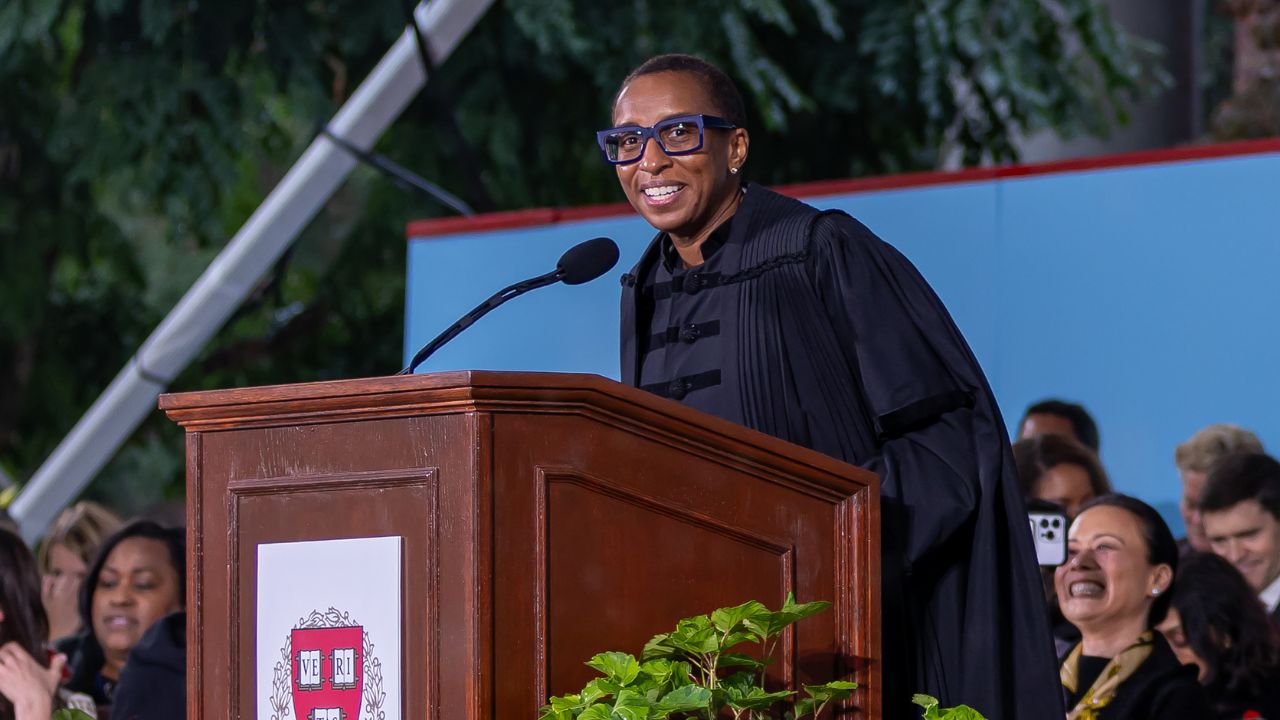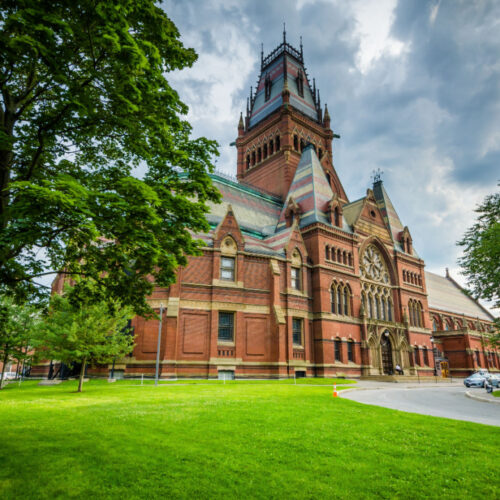Woke Plagiarism

Claudine Gay’s plagiarism isn’t a matter of ‘inadequate citation.’ It was straightforward theft.
Editor’s Note – The saga of Harvard President Claudine Gay was a tale of wokeness, which had a predictable (disastrous) ending. Gay, a black woman, was a woke (diversity) hire. No non-minority candidate who had credentials as threadbare as hers would have even made it to the starting gate; indeed, each of her previous academic appointments was grounded in racial preference.
Just as important as skin color was her extravagant support for a domestic regime of racial recrimination and group quotas. More wokeness. This made it virtually inevitable that she would support pro-Hamas protestors who called for death to the Jews, because under the woke dispensation, Jews are so-called “oppressors.” Because Gay met the board of trustees’ woke requirements, it overlooked her character. It turns out she is a serial plagiarist. No surprise there.
So the board found itself in a bind: having made a woke hire, it could not fire Gay without being called “racist.” Predictably, the board caved. It wrapped itself into knots to justify Gay’s malfeasance. America’s premier university must now stew in its own juices, to its detriment and to the detriment of America.
It was wokeness all the way down.
Harvard says it will not fire President Claudine Gay—no matter her performance at the hearing of the House Committee on Education and the Workforce, and no matter her history of plagiarism in her Ph.D. dissertation and academic articles.
In January 2016, Donald Trump boasted at a campaign rally, “I could stand in the middle of 5th Avenue and shoot somebody and I wouldn’t lose voters.” Trump at least had the good taste not to put his imaginary transgression to the test. Claudine Gay has one-upped him. She provided protective cover for pro-Hamas Harvard students calling for the mass murder of Jews, and obfuscated about this before a Congressional committee. Major donors to Harvard withdrew from their commitments in light of Gay’s soft-on-anti-Semitism approach. Before the dust had settled, the Manhattan Institute’s Christopher Rufo published evidence in City Journal that Gay had plagiarized parts of her Harvard Ph.D. dissertation. And hours later, Aaron Siberium at The Washington Free Beacon published an extensive account of Gay’s plagiarism in the handful of academic articles that she had published over the years. As I write, there is more to come.
Any one of these acts would have been career-ending for most college presidents. Liz Magill was deposed from the presidency of the University of Pennsylvania for her shameful performance at the Congressional hearing and her lint-flicking approach to campus anti-Semitism. But Gay apparently operates with something closer to Trumpian immunity to the usual rules. According to CNN, “more than 700 Harvard faculty members have signed a petition backing Gay.”
Let’s call Gay’s privileged status what it is: Woke immunity. She owes her appointment six months ago to the presidency of Harvard to her extravagant support for a domestic regime of racial recrimination. The single best place to gauge her intellectual temper is a letter she wrote to the Harvard faculty in August 2020, during the midst of the COVID pandemic. At the time Gay was dean of Harvard’s College of Arts and Sciences—and a short-listed candidate for the presidency. The statement was, in essence, her campaign platform. It begins with her declaration that Harvard faced not one but two pandemics: COVID and “white supremacy.”
She opens her window on white supremacy with a panorama of oppression:
“People across the world have risen up in protest against police brutality and systemic racism, awake to the devastating legacies of slavery and white supremacy like never before. The calls for racial justice heard on our streets also echo on our campus, as we reckon with our individual and institutional shortcomings and with our Faculty’s shared responsibility to bring truth to bear on the pernicious effects of structural inequality.”
The word “woke” doesn’t appear in her 1,500-word manifesto, but it doesn’t need to. She has lined up all the pieces and found that Harvard has “a profound opportunity for institutional change.” Those pieces include:
- Redefining “research and teaching” to make both more “inclusive.” That inclusiveness will better prepare Harvard graduates to challenge a “profoundly unequal society.”
- Using “cluster hires” to add more “ethnicity, indigeneity, and migration” to the faculty.
- Using postdoctoral fellowships to put minority candidates on the fast track to faculty appointments.
- Redesigning the “visual culture” of campus to “celebrate diversity” and “confront” a “history, marred by exclusion and discrimination.” (That’s a gentle way of saying removing whatever offends woke standards to achieve “systematic visual change” across the whole campus.)
- Appointing a new Associate Dean of Diversity, Inclusion, and Belonging. “Belonging” was the newest buzzword in 2020, invented to amplify “inclusion.” (It is not enough to include under qualified minorities; you must also convince them they rightfully belong in the places of better qualified faculty and students.)
- Appointing more “staff leaders of color” to spur ‘innovation and creative problem solving,” and advance “inclusive excellence.”
Gay promised that “These initiatives are just a starting place.” “Anti-racist” action would be everywhere in Gay’s “transformed” Harvard. And while she humbly admitted she didn’t have “all the answers,” she promised to be “relentless” in driving the pursuit of “racial justice.”
Relentless is the key word here. As dean, Gay had already established herself as relentless in punishing anyone, student or faculty, who too openly expressed doubts about her agenda. The case I am most familiar with was her treatment of Roland Fryer, a tenured black economist who had the misfortune of turning up empirical results that contradicted Gay’s views on how police interact with the black community and on how disadvantaged black children are in school. In his case, Gay resurrected a discredited charge that Fryer had committed sexual harassment and used it to strip him of his institute and, for a time, suspend him from teaching.
Gay herself of course is black and blackness at Harvard all by itself confers privileged status. She was appointed president after her previous academic appointments each of which was grounded in racial preference. We know this not because Harvard says so but because no non-minority candidate who had credentials as threadbare as Gay’s would have even made it to the starting gate. Since receiving her Ph.D. from Harvard in 1998, she has published no single-author books and as of 2017, eleven articles. She co-edited a book published in 2013. In academic circles generally, this record falls short of mediocrity. For a Harvard professor it is derisory. For the president of Harvard, it is farcical.
For the first black president of Harvard it raises the question, “Is that the best black scholar you could find?” Plainly race was an essential factor, but so was an embrace of radical politics. Gay’s immunity to traditional standards is that she has both. Add to that that the Harvard Corporation itself fears to be held accountable for having installed a rank incompetent.
Put all this together and Gay clearly meets the gold standard for wokeness. She upholds every jot and tittle of radical anti-Western ideology. She endorses double standards that favor minorities. She sees the inviable web of “white supremacy” woven into every aspect of the curriculum, every program, every building, and perhaps every blade of grass on the Harvard Quad. And she comes with the scythe to cut all this down.
Wokeness is a utopian religion that requires the elimination of whatever came before. That means that Western civilization must be burned away to give ground for the new order.
While weighing all this, however, it is important not to lose sight of another factor that is less often discussed these days: the character of the person appointed to lead a college or university. In principle the president of a college embodies the qualities that the college holds dear. If scholarship and intellectual honesty are deemed admirable, the president should be an exemplar of both. If the motto of your college is Veritas, the president should be someone esteemed for truthfulness and be a champion of the search for truth.
Colleges after all are partly in the business of shaping the character of students. That isn’t a mechanical process or something that can be accomplished by taking a “Character 101” course or even a handful of courses in ethics. The closest a college can come to shaping a student’s character is by surrounding students with compelling examples of people who strive to center their own lives on the principles the college enunciates.
Of course, this also works in reverse. If you want to shape students into people who despise the ideals of their culture, you can surround them with charismatic thugs, ungrateful hypocrites, and articulate charlatans.
With that in mind, it is not hard to understand Gay’s initial sympathy with the pro-Hamas protesters. All they were saying is “Give death a chance.” The elimination of a state based on “settler colonialism” is, after all, only a grander version of Gay’s own vision for Harvard. She might not use paragliders and instruments of murder, but in principle undoing the legacy of “white supremacy” is noble, according to Gay’s well-established worldview.
Of course, the rapes, the gruesome dismemberments, the kidnapping, and the like are distasteful to someone like Gay. She could not openly endorse the atrocities, or say like Sherman, “War is hell.” But she could and did simply turn away. For this she was quickly denounced by alumni and by former Harvard President Larry Summers. She adjusted and “distanced” herself—as the Harvard Crimson put it—from the bloodletting and the student groups that endorsed it. But the distancing was delicate. She made sure to affirm that the students “have the right to speak for themselves.”
Do they? The First Amendment makes clear that Congress can pass no law against their freedom of expression, but our Constitution presents no barrier to private universities maintaining some degree of control over the behavior of their students, including their speech. “Speech codes” are the target of the Foundation for Individual Rights and Expression (FIRE) and other “free speech absolutists.” I’ve long parted ways with FIRE and such groups on the grounds that free speech is only one principle among several that contribute to a college’s ability to educate students or a faculty’s ability to engage in teaching and research. The pursuit of truth must be protected from those who would destroy it with counterfeits.
In short, a private institution can prohibit certain kinds of speech if it wants to. And Harvard indeed does that with pronouns. But Harvard has chosen not to do that with expressions of anti-Semitism, calls for destroying Israel, or incitements to “kill the Jews.” At least as President Gay sees it, such statements have to be “weighed in context.” Context, of course, always bears on what the spoken or written word means, but the search for “context” readily blurs into neglect of the obvious declaratory meaning of what an activist says. It becomes a loophole, rather than a means of discernment.
And this is where Gay’s attempts to pose as a champion of free speech, as a somewhat regretful supporter of pro-Hamas activists, and her career as a plagiarist come together. Gay’s academic dishonesty in her dissertation and at least three of her articles illuminates her view of the responsibilities of the scholar toward the written and, by extension, spoken word. Students often plagiarize because it is convenient and they trust their luck that no one will notice. Plagiarism among scholars is much less common because scholars are generally proud of their own ideas and the words they choose to express those ideas. Individuals who lack this pride seldom pursue a career in a field that demands so much writing. I’ve been involved in several cases of dissertations that were rife with plagiarism. All of them involved individuals who coveted the terminal degree but who never sought a career in academe. Gay is exceptional in this regard. From the outset she was dishonest and knew that she was dishonest. How do we explain why she persisted in a line of work in which sooner or later she would be exposed as a plagiarist—and what amounts to the same thing—a liar?
I have no access to her inner thoughts, but her actions seem consistent with her revolutionary temperament. Gay abhors traditional academic standards, which she sees as racist, oppressive, and discriminatory. Those standards exist, in her view, to keep someone like her out of power and in low status. Allying herself to a movement aimed at undermining those standards makes good sense as a way to excuse herself. When serving as dean of Harvard College, Gay oversaw the expulsion of 27 students for academic dishonesty, mostly plagiarism. How did she justify this to herself? Let alone how does the Harvard Corporation justify someone who ruthlessly punishes others for acts she has herself committed over and over?
The answer for both Gay and the Harvard Corporation lies in their commitment to “transformation.” As the 18th century French tactician François de Charette famously put it, “You can’t make an omelet without breaking a few eggs.” The adage is better known as a favorite saying of Vladimir Lenin. In the current vernacular of the American left, it comes out as “By any means necessary.” Or perhaps, “The means justify the ends.”
Gay, backed by the Harvard Corporation, means to level the old Harvard that they depict as a bastion of white privilege, though in reality it has long been more a bastion of meritocracy, where smart kids consumed by ambition go to credential themselves for entry into the top echelons of American society. There is plenty to criticize in that version of meritocracy, but white privilege isn’t even on the list. Gay’s war on “white privilege” simply embodies her resentment of white people as a stand-in for a culture she despises because it is based on ideals of civilized order. Wokeness is a revolution aimed at dissolving that order in favor of a fantasy in which all human hierarchy disappears, except for the hierarchy of victimhood.
It has been several months since I first learned about Gay’s plagiarism. While I waited for the press to get around to reporting it, I gave some thought to how Harvard might excuse her actions. Harvard knew this was coming at least since October, when one of the journalists I was working with blundered into telling the wrong person. I expected Harvard would do what it has just acknowledged doing: appoint a committee that would engineer damage control. This is how Harvard describes it:
With regard to President Gay’s academic writings, the University became aware in late October of allegations regarding three articles. At President Gay’s request, the Fellows promptly initiated an independent review by distinguished political scientists and conducted a review of her published work. On December 9, the Fellows reviewed the results, which revealed a few instances of inadequate citation. While the analysis found no violation of Harvard’s standards for research misconduct, President Gay is proactively requesting four corrections in two articles to insert citations and quotation marks that were omitted from the original publications.
If Gay’s approach to appropriating other people’s research and writing does not violate “Harvard’s standards for research misconduct,” Harvard had better readmit all those students it kicked out for plagiarism. Gay’s plagiarism isn’t a matter of “inadequate citation.” It was straightforward theft, with the plagiarist’s usual signature of changing a word here and there to throw investigators off the trail.
That Harvard could find some “distinguished political scientists” to play this game is no great surprise. Those 700-some Harvard faculty who signed a letter supporting her are a vineyard ripe for harvest. To borrow Gay’s metaphor, Harvard does have a second pandemic. It is an on-going pandemic of dishonesty, excuses, and woke hatred of America.
Peter Wood is the president of the National Association of Scholars.

